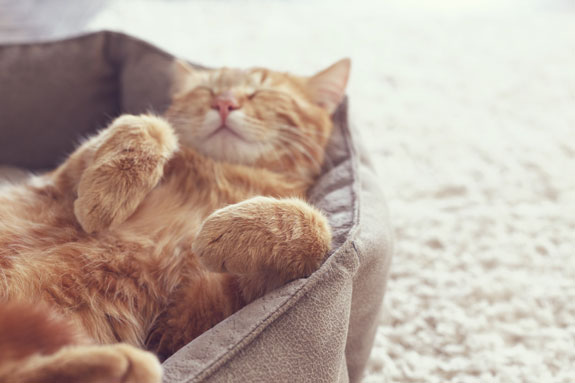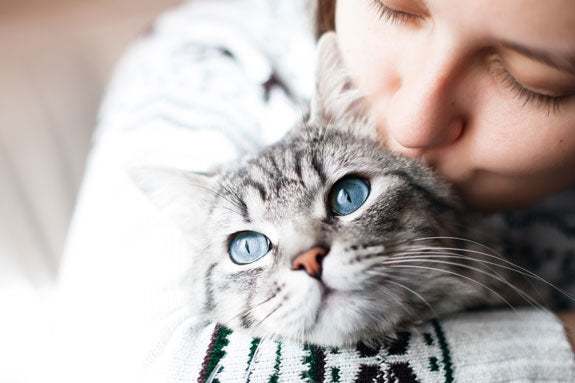A Step-by-Step Guide To Fostering a Cat

WHAT IS FOSTERING?
When you become a foster pet parent, you volunteer to temporarily keep a homeless pet in your home until they find a forever home. Some pets stay for a few weeks, while others can remain for years. Is fostering a cat right for you? Read on to find out.
DIFFERENT TYPES OF FOSTERING
There are various ways to foster cats, each with differing degrees of space, time, and attention needed from the potential foster guardian. You may care for a cat for an indefinite period, and it mainly depends on the cat's needs and how easy the cat is to adopt.
It's important to know the different types of fostering options to gauge which arrangement suits you best. You need to take into account your household situation, the attention the foster cat will need, and the time you are able to commit.
1. Short-term Foster Cats: Some rescue organizations offer programs to foster a cat for just a couple of weeks. This cat may be recovering from a medical condition and might need a more homely location filled with love outside of the rescue group's facilities.
2. Long-term Foster Cats: Long-term foster cats stay in their foster homes until they are adopted. This arrangement can also last indefinitely, ranging from a few weeks to years. Treat this arrangement as an open-ended stay. Other rescue organizations have timelines, depending on the situation, wherein you'll have to commit to taking care of a cat for a specific length of time.
3. Permanent and Hospice Cat Foster Situations: Organizations offer these for animals who may be less likely to be adopted for various reasons, such as their age or health. As opposed to adoption, the rescue continues to provide supplies and medical care.
WHAT ARE THE REQUIREMENTS TO FOSTER?
Fostering doesn't mean that you can take a cat and go. There is a step-by-step process for your to follow as well as several requirements you must meet. The cat adoption process varies between rescue organizations. Some rescues allow the foster to stay in the home until an adopter is found and approved. Others prefer to keep all cats eligible for adoption on their premises.
ARE YOU READY TO FOSTER?

Below is a list of questions for you to consider before ultimately deciding to become a foster parent.
1. Do you have the time?
Just like resident cats, foster cats also need plenty of socialization and commitment. It is a significant part of your duty as a foster parent to frequently socialize and interact with your foster cat daily. Some cats need more guidance and patience to learn "how to be a cat" and be comfortable in your home.
2. What is your space like?
Below are some things you need to consider about your home before you decide to foster:
- How much space can you dedicate solely to your foster, if necessary?
- Are cats permitted in your home? (if you rent a condo or townhome)
- Is your household noisy and active, or is it quiet and calm?
- If you live with other people, how do they feel about you fostering cats?
3. Do you have other pets at home?
If yes, how will you separate the foster cat from other pets in your home? Separating him from the others is best for the safety and comfort of everyone, at least initially. Consider the amount of care your foster will require. your pets must also be up to date on their vaccinations and must be able to get along with other animals, especially ones they are not familiar with.
4. How much does taking care of a foster cat cost?
Let's face it, taking in a cat can be costly, especially those who require special medical care. Fortunately, many rescue organizations cover all medical care, including medication. Some may even supply all the necessities as well. It's important to confirm with the rescue or shelter.
WHERE TO FIND FOSTER KITTENS
Most people foster through rescue organizations or animal shelters. Different adoption organizations have different adoption processes. Browse through the internet, check each website, and compare the rescue's pros and cons. Read up on their policies to find which one best suits your needs and values.
FOSTER PREPARATION
Below are the rundown of what your foster cat may need. Remember, your specific foster may require more supplies.
- Kitten formulas
- Wet and dry food
- Bottles
- Microfleece blankets
- Heating pads
- Incubator (if necessary)
- Cat carriers
- Playpen play yard
- Litter boxes
- Bath essentials
- Food supplements
- Toys
- Scratchers
- Treats
WELCOMING YOUR FOSTER CAT
1. Get your house ready: Ensure that your home is warm, safe, offers a space that is away from other animals, and kitten-proof. The space you plan on keeping your foster should be climate-controlled at a comfortable temperature. Have a heating pad on low and a soft blanket ready for your kitten. A shallow litter box, like the Petmate Basic Litter Box is necessary for kittens above two weeks of age.
2. House introduction: As soon as your foster cat enters your home, show him the litter box as soon as possible. Next show him where the food and water is located and watch him closely as he explores his new surroundings.
3. Routine introduction: Kittens must be introduced to a routine, especially when entering a new home. Foster parents must stimulate their foster kittens, feed them, and show them their environment. As your foster kitten gets older, add in more playtime. Kittens who are only a few weeks old (until 4 weeks old) must be fed and stimulated every 2 – 4 hours, adding an hour in between every week.
SAYING GOODBYE

Surprisingly, the hardest part of fostering a cat isn't dealing with stinky litter boxes and scratched up furniture. Instead, it's saying goodbye. Handing over your foster cat to their forever pet parents who can provide them with a stable, loving home is not easy feat, but is something you should be proud of.
While the separation may sting at first, rest easy knowing you've helped a kitty find it's much deserved forever family. There's always the option to foster more cats and kittens in the future as well!
Sources:
Previous article

Next article

Related posts
View all-

What Can You Use Instead of Cat Litter?
Traditional cat litter is convenient, but it’s not the only option. Many cat owners look for alternatives to reduce waste, save money, or avoid chemicals found in clay-based kitty litter. Some options offer better odor control, while others are more eco-friendly or gentler on a cat’s paws.
Read Article -

How to Keep My Backyard Smelling Fresh
A clean backyard should smell fresh, unlike pet waste, smoke, or mold. Bad smells can linger, especially when dog poop, urine, or food scraps attract flies and bacteria. If your yard has a foul odor, it's time to take action. The first step is cleaning up pet feces, trash, or rotting food. A garden hose can wash away dirt and urine from artificial turf, patios, and decks. To neutralize odor, Use baking soda, white vinegar, and essential oils.
Read Article -

What Supplies Do First-Time Cat Owners Need?
Bringing home a new cat is exciting, but making them feel safe and comfortable takes more than love. First-time cat owners must prepare with the right supplies to ensure a smooth transition. From a litter box to cat food and a warm bed, having the basics ready can help your new kitty settle in faster. This guide covers everything a new cat owner needs to make their new pet feel at home.
Read Article



